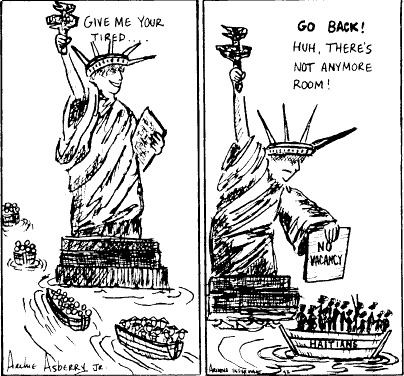
In the last week or so, we’ve been presented with many harrowing stories of the disaster in Haiti. Though the situation is bleak (with the Haitian government estimating up to 200,000 dead) there have also been a number of stories showcasing the compassion and generosity of the more fortunate. Of particular note, the American government’s immediate response to the crisis is laudable. As we speak, our men and women in uniform are taking the lead in the recovery efforts, quickly bringing food, water, and supplies to the distraught nation. Because of these efforts, the Haiti’s main seaport is even poised to reopen in a couple of days. Obviously, our experiences in Indonesia in 2004 and the painful lessons learned in New Orleans the following year have conditioned our response, but what’s next? Despite our monumental efforts to heal the infrastructural and physical wounds caused by the earthquake, our answer to that question has not only been lackluster, but atrocious.
The AJC reports that the United States will maintain it’s unfair policy concerning Haitian migrants and refugees:
Between 250 and 400 immigration detainees are being moved from South Florida’s main detention center to clear space for any Haitians who manage to reach U.S. shores, according to the Homeland Security Department. The Navy base at Guantanamo Bay could house migrants temporarily — far from suspected terrorists also being held there — and the Catholic church is working on a plan to accept Haitian orphans.
The mass migration plan, known as “Operation Vigilant Sentry,” was put in place in 2003 because of previous experiences with Caribbean migrations, said Coast Guard Lt. Cmdr. Chris O’Neil, spokesman for the Homeland Security Task Force Southeast that would manage any Haitian influx.
“There is no new incentive for anyone to try to enter the United States illegally by sea,” O’Neil said. “The goal is to interdict them at sea and repatriate them.”
Raymond Joseph, ambassador of Haiti in Washington, recorded a message in Creole over the weekend, warning his countrymen: “Don’t rush on boats to leave the country.”
“Because, I’ll be honest with you: If you think you will reach the U.S. and all the doors will be wide open to you, that’s not at all the case,” Joseph said, according to a transcript released by the Pentagon. “And they will intercept you right on the water and send you back home where you came from.”
Why?
We are squandering an opportunity to reevaluate a policy that is backwards, wrongheaded, and arguably racist. If we must keep that godawful policy, why not do so after some semblance of government and order is reestablished in Haiti? Or we could grant temporary visas which could ultimately allow migrants to transition into permanent residence, or even citizenship in the long term, depending on what comes of the situation in Haiti. Considering what they’ve been through in the last week, this seems callous. We have a chance to do right by history and we’re throwing it away.

Leave a Reply